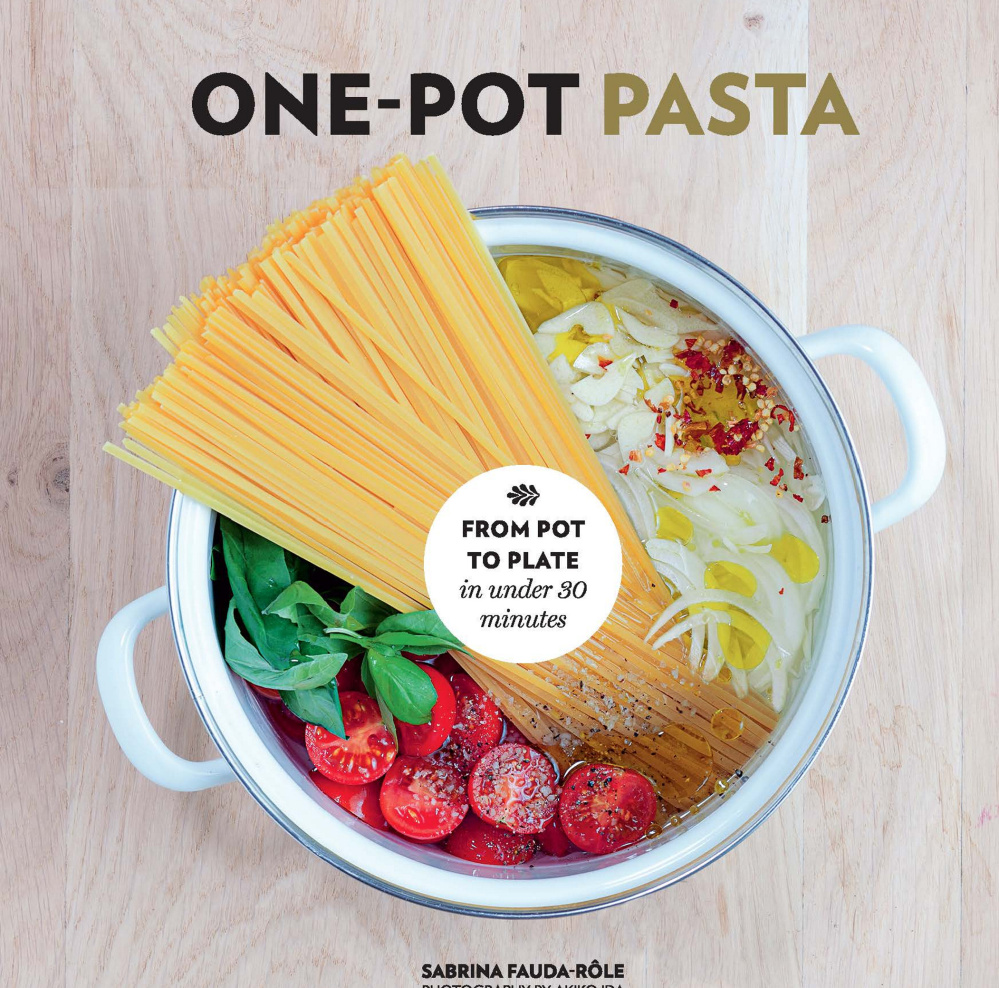“One-Pot Pasta: From pot to plate in under 30 minutes.” By Sabrina Fauda-Role. Hardie Grant Books. $11.99.
Meal planning – for me, at least – is a matter of balancing time, money, healthfulness and flavor.
While pasta dishes tend to meet the requirements of three of those categories, they’ve suffered a bad rap health-wise in recent years, with the demonization of gluten. And when portion control is your Achilles’ heel, making a whole pot of pasta in a one-person household feels like putting a dagger in your pre-summer diet before the water even begins to boil.
But the war on carbs seems to be subsiding with nutrition experts recommending moderation over elimination (i.e. eating like a normal person). So, I decided to test my willpower and picked up “One-Pot Pasta: From pot to plate in under 30 minutes” by Sabrina Fauda-Role.
An introductory chapter explains the general concept behind the recipes: Put all of the ingredients in a pot with a minimal amount of water, then cook on medium heat until the pasta is done and the water has reduced into a creamy sauce, which should take about 15 minutes.
It’s an unusual way to cook pasta, but it’s about as quick and easy as you can get, in terms of both cooking and cleanup. It also can be an effective way of clearing out the refrigerator, as it works with an innumerable combination of ingredients. The book recommends using something creamy, something crunchy and a strongly flavored meat or cheese for each dish, along with herbs and/or spices and a garnish.
But if you’re not feeling creative, the cookbook has more than 30 recipes, from a basic spaghetti in tomato sauce with pre-made meatballs to spiral pasta with smoked mackerel and leeks – what I thought was the best-looking dish in the book, which includes pictures of both the uncooked ingredients in a pot and the finished dish for every recipe.
The recipes are divided into four categories: meat, fish, veggie and cheese, with about half of them in the meat section and more than half of those involving some sort of pork product. Several of these recipes would make great spring pasta dishes – ham and gruyere, artichoke and lardons, asparagus and bacon – and could be a good way to use up any Easter ham that’s still in the freezer.
I settled on a recipe called Carrots, Curry and Sesame, its most important characteristic being that all but three of its ingredients were in my house, taking care of both my time and money requirements.
As for healthfulness, it called for whole-wheat spaghetti, something I’ve been meaning to give a second chance after turning my nose up at it years ago, and coconut milk, rather than the heavy cream that appears in most of the recipes.
I don’t own a low, wide pot like the ones that appear throughout the cookbook, which could account for the less-than-picturesque appearance of the pre-cooked ingredients and the longer cooking time, as the pasta had barely submerged in the liquid by the recommended 15 minutes.
I kept it on the stove for about 10 minutes longer, but cooking times could vary depending on how you like your pasta and how much sauce you want. With this dish, a creamy coating seemed most fitting.
On first taste, the flavor was creamier and less savory than I wanted it to be. That, along with the noticeable heartiness of the whole-wheat pasta, helped keep me from going back for more. And I’m glad I didn’t. Although I thought it might be good cold for lunch the next day, it was too clumpy not to reheat, and, once I did, the result was far better than what I had the night before. Topped with grilled chicken and with time for the flavors to meld, it felt more like a unified dish, the sesame and curry flavors emerging more prominently out from under the coconut milk. Suddenly, the pot of leftovers became much more dangerous.

CARROTS, CURRY AND SESAME
From “One-Pot Pasta: From pot to plate in under 30 minutes.” Sabrina Fauda-Role gives the measurements in metric and ounces (the publisher is British), so it may be helpful to have a cooking scale.
Serves 4
250 g (9 ounces) whole-wheat spaghetti
1 carrot, grated
250 ml (8.5 fluid ounces) coconut milk
1 small sprig of coriander (cilantro)
1 teaspoon curry powder
1 teaspoon sesame oil
20 g (3/4 ounce) golden sesame seeds
2 spring onions (scallions), thinly sliced
1 garlic clove, thinly sliced
1 teaspoon rock salt (I used Kosher salt)
750 ml (25 fluid ounces) water
Set aside a few slices of spring onion and sesame seeds. Put all other ingredients into a large saucepan in the order listed. Cook for approximately 15 minutes over a medium heat, stirring regularly. About 2 centimeters (3/4 inch) of cooking liquid should remain at the end. Sprinkle the reserved sliced spring onions and sesame seeds on top.
Send questions/comments to the editors.




Comments are no longer available on this story